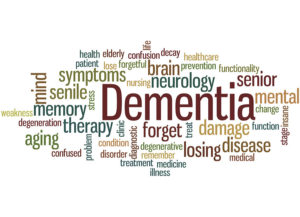For seniors who struggle with both dementia and depression, treatment can be difficult. Such patients may not respond to traditional treatments such as talk therapy or antidepressants.
The problem is compounded because dementia and depression work together and amplify one another. Dementia patients become depressed because they have trouble interpreting their environment and may not be able to relate to loved ones as they did before. Their depression, in turn, may worsen their dementia, making it resistant to treatment.
To solve this problem, a group of scientists developed the Problem Adaptation Therapy (PATH) approach to treating patients with simultaneous dementia and depression. PATH is intended for patients with mild to moderate dementia and depression.
Patients who undertook PATH treatment in one study were 3.6 times more likely to go into short-term, but complete remissions from their depression and cognitive impairment. Partial remissions are also common with this treatment.
One wonderful aspect of this therapy is that it is designed so that seniors can learn it at home. Caregivers can participate in helping the senior implement this approach. Professional home care workers can also support the therapy and keep the senior on track to benefit from its principles.
PATH keeps seniors focused on positive experiences

Caregiver Oyster Bay, NY: Problem Adaptation Therapy
One thing that PATH therapy teaches is to replace negative situations with positive situations. First, the therapist along with the patient and caregivers identifies situations that trigger unhappy thoughts in your senior.
For example, if trying to open a bottle of medications causes frustration, the patient is advised not to try to open the bottle himself. Home care professionals can help administer the medication or put it into an easier to open pill box.
While eliminating stressful triggers, PATH therapy also teaches patients to replace those situations with enjoyable situations which might include quilting, woodworking, singing, or painting with watercolors. Using interactive technology like Skype or Zoom to chat with family members may also be an extremely enjoyable experience.
By lining up enjoyable activities, PATH therapy provides some structure and sense of meaning to the senior’s day. And a meaningful life is better steeled against depression and cognitive loss. Boredom and a day with nothing planned are the enemies of mental health.
PATH also emphasizes expressing emotions so as to get them out in the open and deal with them. When caregivers and home care workers understand what emotions the patient has, they can more effectively help the senior address them.
PATH teaches patients to compensate for memory loss
When memory starts to fail, there’s nothing like a big wall calendar to help keep a patient on a schedule. PATH teaches patients to use calendars, signs, and checklists to keep themselves functioning independently and structuring their day effectively.
In conclusion, PATH can be a very effective therapy for some seniors who suffer mild to moderate dementia along with depression. It is a targeted and outcome-centric therapy which has been shown to produce good and immediate results. And those results are happier, more fulfilled people over 65. That’s what all caregivers and home care workers want.
If you or an aging loved-one is considering a Caregiver in Oyster Bay, NY please contact the caring staff at Brookville Homecare today. 516-802-7722
Sources
https://www.ncbi.nlm.nih.gov/pmc/articles/PMC4583822/
https://jamanetwork.com/journals/jamapsychiatry/fullarticle/1922089
